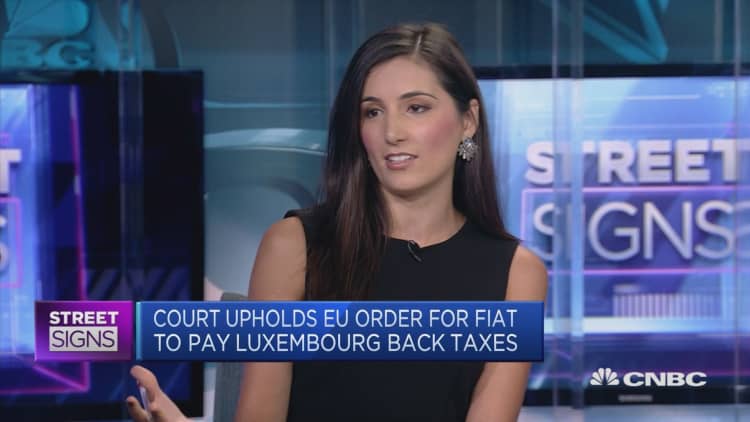EU court rulings for Starbucks and Fiat could indicate how similar tax investigations will play out and potentially push Brussels to probe more major multinational firms, industry experts have told CNBC.
Europe's second highest court decided last Tuesday that Fiat should repay up to 30 million euros ($32 million) back in taxes. In a separate, yet similar case, the same court said Starbucks did not have to pay back a similar amount. The court action took place after the European Commission — the EU's executive arm — said in 2015 that Fiat and Starbucks had received illegal tax benefits in Luxembourg and the Netherlands, respectively.
"These judgments (on Starbucks and Fiat) make it likely that the Commission will open more investigations," Genevra Forwood, a partner at White & Case, explained via telephone with CNBC.
The Commission is responsible for ensuring a level-playing field across the 28 EU member states, where different companies compete but follow the same rules. The Commission controls state aid — where a firm receives government support and can gain an advantage over competitors. State aid is illegal in the European Union unless justified by reasons of economic development.
The Starbucks and Fiat cases were the first probes that the Commission took in the area of tax state aid. Therefore, the subsequent conclusions that the general court took could work as a precedent to further probes into tax state aid.
Starbucks' shares are up by about 50% from a year ago and Fiat's are almost 20% lower over the last 12 months.
Michel Petite, a lawyer at Clifford Chance, who co-represented Starbucks in the appeal against the Commission, told CNBC Tuesday via phone that last week, "the court confirm(ed) that the Commission has the power to investigate these matters." He suggested that on this basis the Commission is likely to carry on work in this area.
The Commission will continue to look at aggressive tax planning measures under EU state aid rules to assess if they result in illegal state aid.Margrethe VestagerEurope's competition commissioner
The EU's general court decision on Fiat and Starbucks upheld the Commission's role in looking at national tax arrangements. Some EU member states have in the past criticized the Commission's position and for interfering in what's seen as a national policy matter.
Jean Schaffner, partner at law firm Allen & Overy's in Luxembourg, told CNBC Wednesday that the Commission cannot be seen as trying to harmonize tax across the 28 European countries. This would mean that Brussels was going beyond its institutional powers.
Why did the EU's general court rule differently?
The European Commission did not prove that Starbucks paid less taxes as a result of the tax arrangements provided by the Netherlands, Forwood told CNBC. So, despite the similarity between the Fiat and Starbucks tax cases, the court ruled differently, Forwood explained.
The two outcomes proved that the approach taken by the Commission when investigating state aid was correct. However, the outcomes also show that the EU fell short of proving there was a clear advantage granted to Starbucks.

"The Commission will continue to look at aggressive tax planning measures under EU state aid rules to assess if they result in illegal state aid," Margrethe Vestager, The EU's competition commissioner said in a statement after the decisions last week.
Forwood explained to CNBC that the Commission will now likely put more effort into proving that the tax schemes by certain countries provided a clear advantage to the companies investigated.
This would then make it less likely that the courts would rule against the Commission in the future, as was the case with Starbucks.
What other companies are being investigated?
Vestager, who's due to start her second mandate on November 1, has opened a number of investigations into companies operating in Europe since her appointment in 2015.
Ikea, for example, has been under investigation by the Commission since 2017 for allegedly benefiting from illegal tax benefits in the Netherlands. This investigation is yet to reach a conclusion. Other companies being investigated include Nike and Huhtamäki.
There is also an ongoing legal battle with the EU, Ireland and Apple. Vestager said in 2016 that an agreement between Dublin and the U.S. tech giant was against EU law and ordered Ireland to recoup 13 billion euros ($14 billion) from Apple. The member state and the U.S. company appealed the decision and a European court is currently assessing whether the Commission was correct with its probe.
Speaking to CNBC Wednesday, Philip Andrews, a partner at the Dublin-based law firm McCann FitzGerald, said that the Starbucks case could "potentially advance the Commission's case against Apple."
Shares of Apple are about 6% lower from a year ago.


